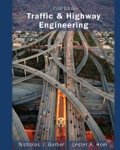
Traffic and Highway Engineering
5th Edition
ISBN: 9781305156241
Author: Garber, Nicholas J.
Publisher: Cengage Learning
expand_more
expand_more
format_list_bulleted
Textbook Question
Chapter 18, Problem 5P
Given the specifications for an asphaltic concrete mixture and the results of a sieve analysis, determine the proportion of different aggregates to obtain the required gradation.
Coarse aggregates: 60%
Fine aggregates: 35%
Filler: 5%
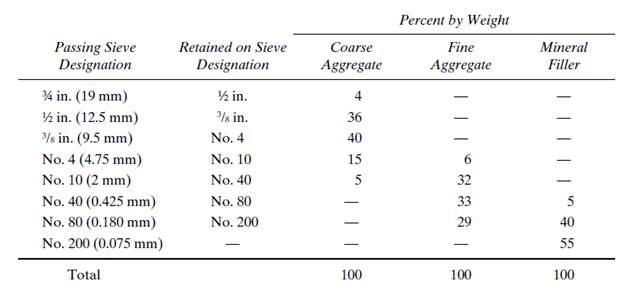
Expert Solution & Answer
Want to see the full answer?
Check out a sample textbook solution
Students have asked these similar questions
PLEASE SOLVE THE QUESTIONS IN THE PICTURE, make sure you show all of your work please. Thank you for your help!
Please solve the following question in the picture, make sure you show all of your work and formulas you use. Thank you so much for your help!
Determine all the quantities mentioned. Show complete solution using Mohr's Circle only.
Chapter 18 Solutions
Traffic and Highway Engineering
Ch. 18 - Prob. 1PCh. 18 - Prob. 2PCh. 18 - Prob. 3PCh. 18 - Prob. 4PCh. 18 - Given the specifications for an asphaltic concrete...Ch. 18 - Given the particle size distributions of two...Ch. 18 - Given the particle size distributions of two...Ch. 18 - Given four different types of aggregates to be...Ch. 18 - Prob. 9PCh. 18 - Prob. 10P
Knowledge Booster
Learn more about
Need a deep-dive on the concept behind this application? Look no further. Learn more about this topic, civil-engineering and related others by exploring similar questions and additional content below.Similar questions
- B: Find the area of the region in the first quadrant that is within the cardioid r=1-cos 0 1-cos e TT/2 0arrow_forwardPlease do not use any AI tools to solve this question. I need a fully manual, step-by-step solution with clear explanations, as if it were done by a human tutor. No AI-generated responses, please.arrow_forwardPseudomonas putida is being used to biodegrade toluene in an in-situ, aerobic bioremediation system. The environmental conditions are oligotrophic, in that Pseudomonas is starved for other nutrients and organic carbon/energy sources, including toluene, which is present at low concentrations (S0 = 5 mg/L). It is able to perform oxidative phosphorylation using toluene as an electron donor to obtain ATP as a primary energy source that primarily fuels its biosynthesis pathways (i.e., fs ~ 1). During this oxidation process, toluene is degraded to a less harmful metabolite, benzoic acid. a) Given this information write out the kinetic model to describe the substrate degradation profile as a function of time. b) With the information in the Table below, compute the substrate (S) and biomass concentrations (X) after 3.5 days have elapsed. Assume that the initial degrading population is quite low, given the oligotrophic conditions (X0 = 0.5 mg/L). Biokinetic Model Parameter μmax Ks Y Kd Value…arrow_forward
- A pure bacterial culture is growing in a warm, oxygenated, and nutrient rich solution present in a batch reactor system. Given what you know about doubling times: a) Estimate the specific growth rate of this culture if the generation time is determined to be 40 minutes. b) If 60 cells are present initially, calculate the mass of cells present after a 16-hour period. Assume that the biomass weighs 5.7E-10 mg/cell.arrow_forwardHow do different urban structures influence a city’s economic health over time? Provide an example of a structure that strengthened or weakened a city.arrow_forward*688* -2.625- —1.250- (d) 1. It is double dimensioned. 2. The extension lines are too long. 3. It has a dimension to a hidden line. 4. The dimensions are on the part.arrow_forward
- Consider the soil profile below: 3m Vary 18.3kN/m Sand Groundwater table 6m -19.8kN/m² 4m Clay Sand Calculate the effective stress at the location of the red star (4m inside clay layer) if the saturated unit weight of the clay is 21.8 kN/m^3 Note: give your answer in units of kPa A sample of the clay layer in the previous problem is extracted from the location of the red star and tested in the lab. Vertical strain, &, (%) 1 50 40 10 100 1000 Effective consolidation stress, σ (kPa) Odometer testing yielded the following consolidation curve (red line): Calculate the over-consolidation ratio of the clay sample. Use two decimal places.arrow_forwardNote: this question is part of soil mechanics Submit a neat, step-by-step handwritten solution that is fully worked out manually without any AI involvement. The solution must be expert-level, with all steps simplified and clearly shown. I will evaluate it based on precision and completeness, using the attached image as a reference. Ensure every part is thoroughly checked for accuracy before submission. Thank you.arrow_forwardNote: the two questions are connected as parts so please answer soil mechanics question as best you can !. Provide a clear, step-by-step simplified handwritten solution (with no extra explanations) that is entirely produced by hand without any AI help. I require an expert-level answer, and I will assess it based on the quality and accuracy of the work, referring to the attached image for additional guidance. Make sure every detail is carefully verified for correctness before you submit. Thanks!.arrow_forward
arrow_back_ios
SEE MORE QUESTIONS
arrow_forward_ios
Recommended textbooks for you
 Traffic and Highway EngineeringCivil EngineeringISBN:9781305156241Author:Garber, Nicholas J.Publisher:Cengage Learning
Traffic and Highway EngineeringCivil EngineeringISBN:9781305156241Author:Garber, Nicholas J.Publisher:Cengage Learning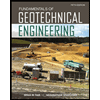 Fundamentals of Geotechnical Engineering (MindTap...Civil EngineeringISBN:9781305635180Author:Braja M. Das, Nagaratnam SivakuganPublisher:Cengage Learning
Fundamentals of Geotechnical Engineering (MindTap...Civil EngineeringISBN:9781305635180Author:Braja M. Das, Nagaratnam SivakuganPublisher:Cengage Learning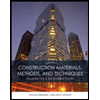 Construction Materials, Methods and Techniques (M...Civil EngineeringISBN:9781305086272Author:William P. Spence, Eva KultermannPublisher:Cengage Learning
Construction Materials, Methods and Techniques (M...Civil EngineeringISBN:9781305086272Author:William P. Spence, Eva KultermannPublisher:Cengage Learning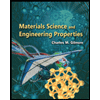 Materials Science And Engineering PropertiesCivil EngineeringISBN:9781111988609Author:Charles GilmorePublisher:Cengage Learning
Materials Science And Engineering PropertiesCivil EngineeringISBN:9781111988609Author:Charles GilmorePublisher:Cengage Learning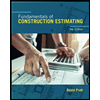 Fundamentals Of Construction EstimatingCivil EngineeringISBN:9781337399395Author:Pratt, David J.Publisher:Cengage,
Fundamentals Of Construction EstimatingCivil EngineeringISBN:9781337399395Author:Pratt, David J.Publisher:Cengage,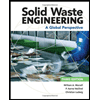 Solid Waste EngineeringCivil EngineeringISBN:9781305635203Author:Worrell, William A.Publisher:Cengage Learning,
Solid Waste EngineeringCivil EngineeringISBN:9781305635203Author:Worrell, William A.Publisher:Cengage Learning,

Traffic and Highway Engineering
Civil Engineering
ISBN:9781305156241
Author:Garber, Nicholas J.
Publisher:Cengage Learning

Fundamentals of Geotechnical Engineering (MindTap...
Civil Engineering
ISBN:9781305635180
Author:Braja M. Das, Nagaratnam Sivakugan
Publisher:Cengage Learning

Construction Materials, Methods and Techniques (M...
Civil Engineering
ISBN:9781305086272
Author:William P. Spence, Eva Kultermann
Publisher:Cengage Learning

Materials Science And Engineering Properties
Civil Engineering
ISBN:9781111988609
Author:Charles Gilmore
Publisher:Cengage Learning

Fundamentals Of Construction Estimating
Civil Engineering
ISBN:9781337399395
Author:Pratt, David J.
Publisher:Cengage,

Solid Waste Engineering
Civil Engineering
ISBN:9781305635203
Author:Worrell, William A.
Publisher:Cengage Learning,
Aggregates: Properties; Author: nptelhrd;https://www.youtube.com/watch?v=49yGZYeokKM;License: Standard YouTube License, CC-BY